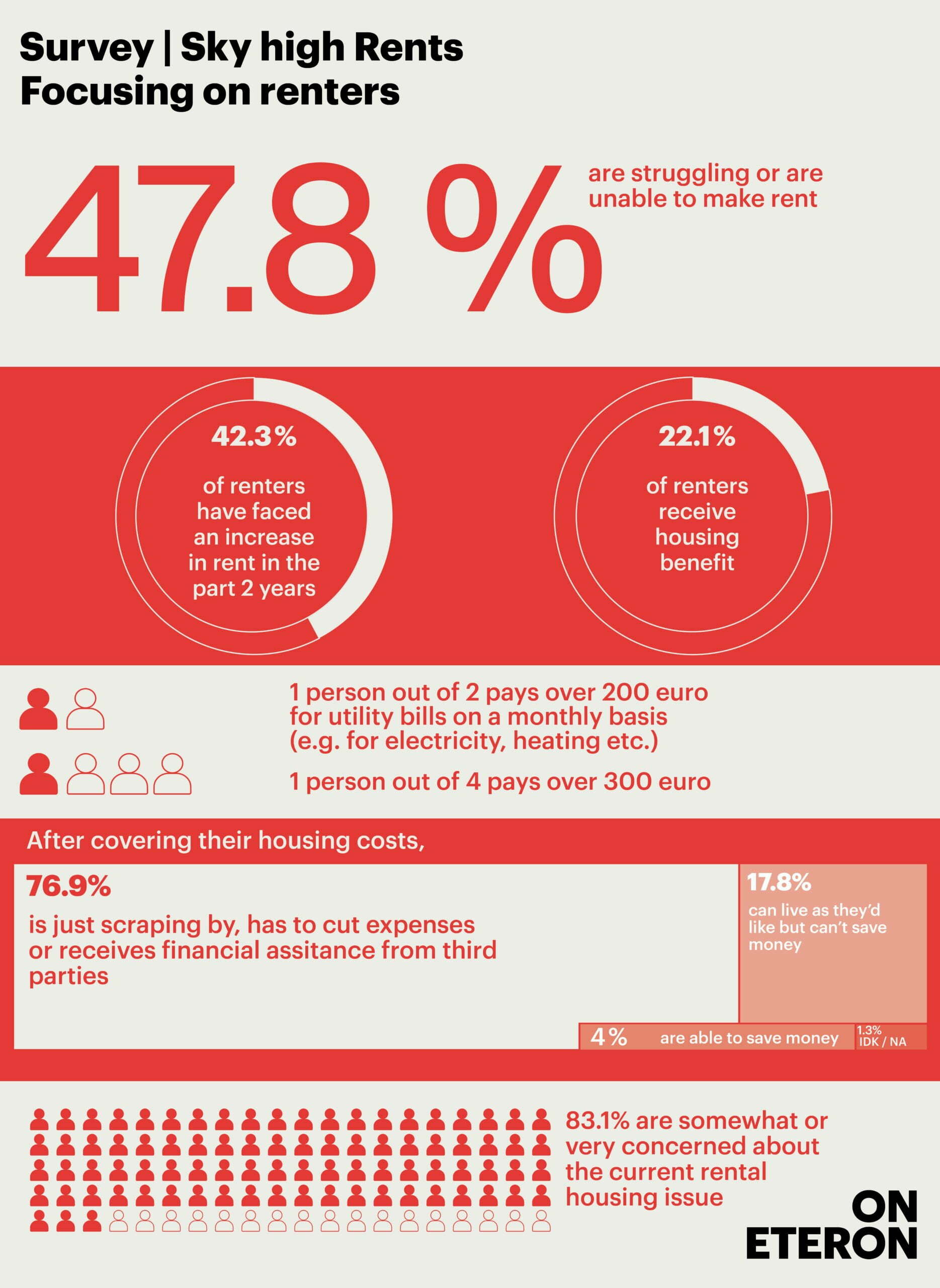
Eteron Research | Sky-high rents: Focusing on renters
With rents and overall housing costs constantly rising, the housing market experiencing significant transformations that call into question some of the basic constants in the Greek pattern of access to housing, and the households’ real income facing multiple pressures, people living in rented accommodation are currently experiencing a new range of housing insecurity.
In order to better understand the way and the intensity with which renters experience said insecurity, as well as how they perceive the problem and consequently identify the solutions needed to tackle it, Eteron – Institute for Research and Social Change proceeded with the first nationwide quantitative survey, focusing exclusively on people living in rented accommodation.
 The survey was conducted between 24 May and 3 June 2022 by aboutpeople, on a sample of 1,007 people from across the country, using online interviews. The questionnaire was developed by Eteron in collaboration with the scientific team of the “Sky-high Rents” Project.
The survey was conducted between 24 May and 3 June 2022 by aboutpeople, on a sample of 1,007 people from across the country, using online interviews. The questionnaire was developed by Eteron in collaboration with the scientific team of the “Sky-high Rents” Project.
The quantitative survey’s main findings are the following:
– Half of the renters (47.8%) struggle or are unable to make rent, while 83.1% are somewhat or very concerned about the current rental housing issue.
– 61.7% state that they have to make cuts in their basic needs and 15.2% admit that they have to receive financial support or borrow money from third parties in order to cover basic expenses.
– The main feelings experienced by those living on the rent are insecurity and anxiety.
– 49.1% stated that they’re unable to save because of housing expenses, 41% said they struggle financially, 28.6% talk of having to cancel personal plans and 12.6% had to seek a second job in order to cover their housing expenses.
– The top five issues that renters face are: expensive energy, high rents, difficulty finding property to rent, inadequate/ really bad quality housing and the lack of heating/ cooling system in the flat.
– One out of five (22.1%) currently receive housing benefit.
– The government (57.1%) and landlords (50.2%) are those mainly responsible for the housing crisis, according to the participants.
– In order to address/ solve the issue, the participants would like an increase in salaries and job opportunities (56.5%), setting a cap on rents (53.3%), tax incentives for landlords who rent their properties for less (37.9%), giving housing benefits to more people (33.2%), developing policies for social housing (23.8%), regulating Airbnb (19.7%), utilising vacant state property (19.2%) and monitoring speculative investments (golden visa etc.)
– The weight and the expectations for a solution fall on the shoulders of the State (46%) and the government (41.1%), followed by the “Market” (28.4%), renters’ organisations (19.6%) and the European Union (15.4%).
Eteron’s director, Gabriel Sakellaridis commented that: “With these two important tools, the Institute is significantly contributing to the current dialogue regarding the housing issue and particularly the part that concerns the rental housing crisis – a very real social issue. In fact, it is a “silent crisis” that maybe isn’t expressed explicitly but it concerns households very much, it’s a topic of discussion and deliberation amongst family members and groups of friends and a determining factor both when it comes to family budgeting as well as everyone’s emotional state. It is now time for housing and rents to be brought to the centre stage in terms of public policy and for the State to stop hiding behind its finger. After all, this isn’t like re-inventing the wheel. This discussion is already taking place all across Europe and there are important good practice examples that could ensure social justice”.
Read also
Analysis of the survey’s results by Petros Ioannidis, political analyst and director of aboutpeople
Analysis by Alkis Kafetzis, project coordinator, “Sky-high rents: In search of solutions”
Executive Summary: For the right to affordable rental housing


